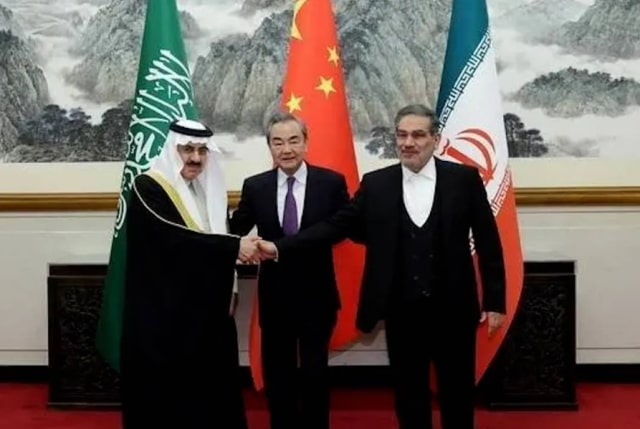
China Plays Peace Dragon In West Asia, What Next?
With the double whammy scored in a matter of a month by brokering a rapprochement between Iran and Saudi Arabia and by boosting an isolated Vladimir Putin by meeting in Moscow, China has attained the global centre stage. The twin diplomatic feats pose a direct challenge to the United States-led West that has long determined war and peace in West Asia and is out to defeat Vladimir Putin’s Russia in Ukraine.
There is a message for India. It has, for now at least, missed the bus in both regions. It has centuries-long cultural and commercial ties with the West Asian region. Millions of Indians work there. But relations with individual nations in the region have not added up to an image and presence in West Asia. The newbie China has done it.
Walking the diplomatic tightrope of the Ukraine conflict and refusing to condemn Putin’s actions, India has hoped to play the mediator at some stage. Prime Minister Modi’s acolytes would have you believe this. President Xi Jinping’s set of peace proposals to end the conflict in Ukraine, coming from a partisan, are unlikely to be accepted by the West. But they pre-empt any Indian initiative for now.
Indeed, for the Western nations boosting Ukraine’s resistance, such a Chinese move would amount to a strategic sacrilege. China is the reason why Russia, besides its own enormous strength, is able to rough it out in Ukraine where it did not anticipate being bogged down. But it shows no sign of suing for peace either.
Xi’s Moscow visit signals that Beijing is firmly behind Moscow, and that, having invested heavily in diplomatic and economic terms, with likely future gains for itself, it will not allow Russia to lose. If that prolongs the conflict, and destruction of Ukraine, so be it. It’s all taking place as US ties with China, which began to fray with former President Donald Trump’s trade war, keep worsening under Joe Biden. As Bloomberg reported, after talking to many Biden administration officials, the US ‘fears’ that a war-weary world may embrace China’s Ukraine peace bid.
Saying all this, however, is different from an overwhelming number of Western analysts, and most Indian analysts who take their cue from them. They all warned Modi against the ‘folly’ of tacitly supporting Russia. Concessional Russian oil has helped ‘grease’ the Indian line of reasoning, though. Russia is now India’s largest oil supplier and in 2022, the bilateral trade between the two countries touched a record high of $31 billion.
Western interests are unwavering against China, and Russia — Ukraine or no Ukraine — is secondary. For India, too, closer to the Western camp than ever before, while China is the principal threat, Russia, a traditional friend, can be chided and warned from time to time since India must remain and appear ‘balanced’ in the eyes of the Western allies.
Xi’s Moscow sojourn confirms China as Russia’s major partner. To that extent, this reduces India’s diplomatic space in Moscow, and that could push India further into the US-led camp. Already, India and China’s relations are strained over the military deployments at the Line of Actual Control (LAC), which has also turned violent at times. China has openly expressed displeasure about India’s proximity to the United States and also criticizes any developments related to the Indo-Pacific.
ALSO READ: Saudi-Iran Agreement – A Victory For China
Watch the power play in the Indo-Pacific. Xi’s trip to Russia was preceded by Japanese Prime Minister Fumio Kishida’s to Ukraine. And Kishida, before going there, conferred with Modi. And Modi had by then met Australian Prime Minister Anthony Albanese.
But while Ukraine, the current distraction shows all signs of lengthening, the real tussle is in the Indo-Pacific. The US and Europe would like to have their domination, while China is striving for a favourable balance. Thus, major power polarization has become the order of the day. This is a warning sign for all nations, including India, of the shape of things to come.
Taking together Xi’s visit to Moscow and his new foreign minister Qin Gang’s hosting of Saudi Arabia and Iran, the message is more for the US and Europe than anyone else. It signals the loss of credibility if not of strength.
Europe’s economies, already slowing, have been hurt by the Ukraine conflict. They were not ready for the Russian energy embargo in retaliation to their economic sanctions. Following President Joe Biden’s entry into Ukraine, they want to ‘defeat’ Putin, but cannot spell how. They are unlikely to roll back the NATO expansion, the reason why Putin invaded Ukraine. And now the latter has become the sacrificial goat in this proxy war.
The US and Europe have shown consistency in pushing NATO’s frontiers that Russia finds too close to comfort. By contrast, right under their nose, China has shown quiet consistency in forging ties with West Asia, at least over the last ten years. Xi visited Saudi Arabia and had meetings with the Iranian leadership – enough to hold their hands and end their mutual distrust.
China has been a major presence in the West Asian region for several years. It is a major buyer of their energy, a major trade partner, an investment partner and a logistical partner. The new thing is that it has extended its role with regard to political issues.
As retired Indian diplomat and a veteran West Asia scholar Talmiz Ahmad points out: “Every major university in the world has Chinese scholars. Every major Chinese university has a centre for West Asian studies. They have more than 1,000 West Asian scholars in China. China now has very high stakes in the region’s stability.”
China has stepped into space vacated by the West. Iran and the US have been cross with each other for over four decades now. And the Saudi Crown Prince has for a year now been trying to reduce his dependence on the Americans. As The Financial Times says, “This is a challenge to the United States, whose traditionally strong relations with Riyadh have cooled.” In a sense, West Asia has come of age.
To put the two complex developments in simple terms, it is China’s ‘soft’ power at work – achieving success without the use of force – against the use of force by the US-led alliance.
The writer can be contacted at mahendraved07@gmail.com



